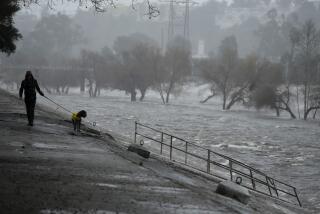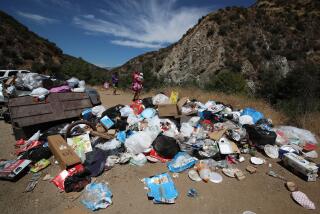L.A. urged to fight expansion of coal mine near Utah’s Bryce Canyon
Environmental groups are urging Los Angeles lawmakers to fight the proposed expansion of a strip mine near Utah’s Bryce Canyon National Park that for years has helped power Southern California.
The City Council is considering a resolution opposing the expansion of the Coal Hollow Mine onto federal lands. The mine produces coal for Utah’s Intermountain Power Plant, which in turn provides the Los Angeles Department of Water and Power with more than a quarter of its electricity.
The company that owns the 635-acre mine wants to expand its operations more than fivefold to meet ongoing demand. But Bryce Canyon officials oppose the plan and have challenged the methodology used in a draft environmental impact study. The study determined that the mine expansion would diminish air quality and hurt the region’s tourism industry, but it recommended allowing the expansion in part because a larger mine would bring employment and tax revenue to the region.
The Sierra Club and other groups staged a City Hall rally to call for the passage of the resolution Friday morning, but the council continued the item until next week. Councilman Paul Koretz, who opposes the mine expansion, said DWP officials had expressed concern about that resolution and a related one that would lend city support to Environmental Protection Agency enforcement of clean-air standards.
Despite pledges by Mayor Antonio Villaraigosa to wean Los Angeles off coal entirely by 2020, the DWP still gets more of its power from coal than from any other source. Developing renewable and natural gas alternatives to completely replace coal would require big rate increases, DWP officials say. An added obstacle is the agency’s contract with the Utah plant, which requires L.A. to buy power until 2027.
DWP spokesman Joe Ramallo said the agency supports the clean-air standards, so long as they are implemented on a reasonable time frame, and that the Coal Hollow Mine expansion is being vetted by federal regulators.
Ramallo said the DWP is “100% committed” to eliminating coal and complying with other environmental mandates, including increasing its renewable energy levels to 33% by 2020, reducing CO2 emissions and eliminating the use of ocean water to cool three coastal power plants. But in this period of transition, he said, “we must be careful to ensure realistic compliance deadlines, understand the technical and operational risks, and not to do anything that will affect our ability to reliably provide power or lead to unnecessarily high costs for our customers.”
More to Read
Start your day right
Sign up for Essential California for news, features and recommendations from the L.A. Times and beyond in your inbox six days a week.
You may occasionally receive promotional content from the Los Angeles Times.







